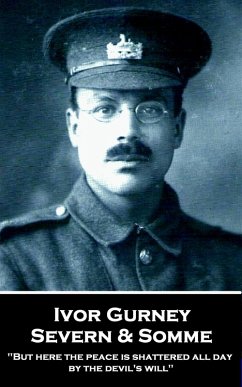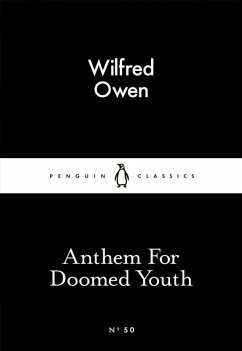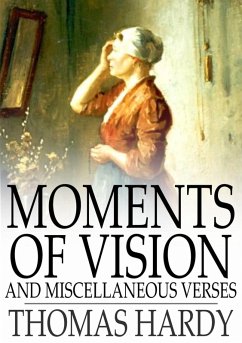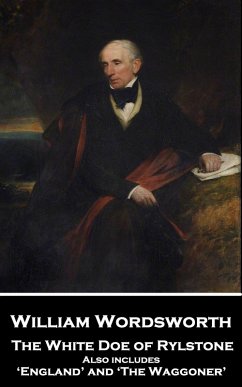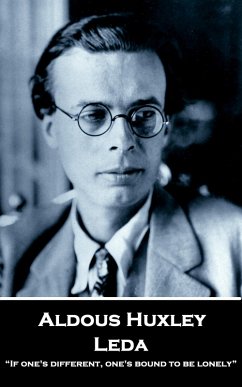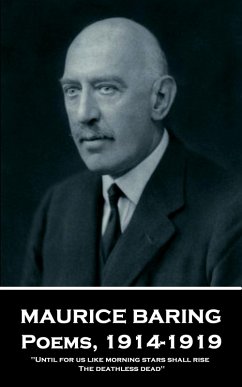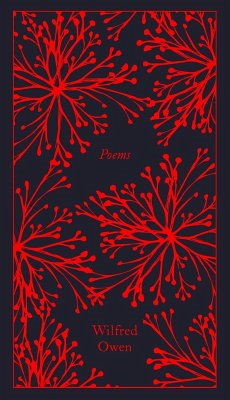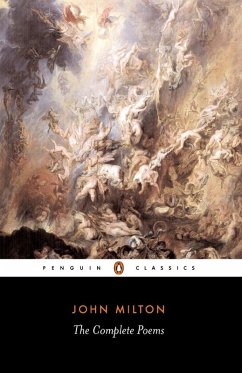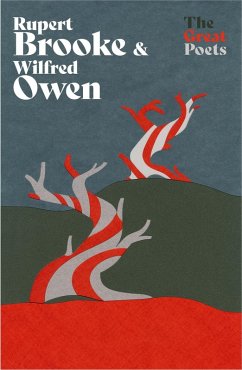
A Lap Full of Seed (eBook, ePUB)
'For every dream that lives in , Time or Eternity makes true''
Versandkostenfrei!
Sofort per Download lieferbar
2,99 €
inkl. MwSt.
Weitere Ausgaben:

PAYBACK Punkte
1 °P sammeln!
Mark Plowman, but known as Max Plowman, was born in Northumberland Park, Tottenham, Middlesex on 1st September 1883.At 16 he left school and took up a position with his father's brick business before becoming a journalist and poet.Politically Plowman was opposed to fighting in the war and embraced pacifist beliefs. He called it "insane and unmitigated filth" but despite his stance, and his marriage earlier in the year to Dorothy Lloyd Sulman, on Christmas Eve 1914 he reluctantly volunteered for enlistment in the Territorial Army, Royal Army Medical Corps and 4th Field Ambulance.He later accept...
Mark Plowman, but known as Max Plowman, was born in Northumberland Park, Tottenham, Middlesex on 1st September 1883.
At 16 he left school and took up a position with his father's brick business before becoming a journalist and poet.
Politically Plowman was opposed to fighting in the war and embraced pacifist beliefs. He called it "insane and unmitigated filth" but despite his stance, and his marriage earlier in the year to Dorothy Lloyd Sulman, on Christmas Eve 1914 he reluctantly volunteered for enlistment in the Territorial Army, Royal Army Medical Corps and 4th Field Ambulance.
He later accepted a commission in the 10th Battalion, Yorkshire Regiment, and serving at Albert, near to the Somme on the Western Front, he suffered concussion from an exploding shell. He was sent home to convalesce at Bowhill Auxiliary, a branch of Craiglockhart, where he was treated by W. H. R. Rivers, who had earlier treated the War Poets, Wilfred Owen and Siegfried Sassoon.
In 1917 Plowman produced a poetry collection, 'A Lap Full of Seed', and an anonymous pamphlet, 'The Right to Live', arguing against the kind of society that made war inevitable. Having been granted a further month's home service in January 1918, he wrote to his battalion adjutant asking to be relieved of his commission on the grounds of a religious conscientious objection to all war.
This went badly for him. Plowman was arrested and tried by court martial on 5th April 1918 for refusing to return to his unit. He was dismissed from the Army without punishment. However, subsequent to this he was, on 29th June 1918, served with notice of call-up as a conscript, but successfully applied to Hampstead Military Service Tribunal for exemption as a conscientious objector.
This would now be the theme of his life.
His memoir of the war 'A Subaltern on the Somme' was published in 1928, under the pseudonym "Mark VII".
In 1930 Plowman joined John Middleton Murry and Richard Rees in positioning The Adelphi publication as a socialist monthly with a commitment to pacifism and aligned with Independent Labour Party. Plowman also found the time and energy to write for other publications including 'The New Age', 'Peace News', 'Twentieth Century', 'Now and Then' and the Theosophical journal 'The Aryan Path'.
Plowman co-founded in 1934 and ran an early commune, the Adelphi Centre, based at a farm in Langham, Essex acquired by Middleton Murry. Although it was short lived it did run a star studded Summer School in August 1936: George Orwell (who years before had reviewed books for them) spoke on 'An Outsider Sees the Distressed Areas' on 4th August. Other speakers were Steve Shaw, Herbert Read, Grace Rogers, J. Hampden Jackson, N. A. Holdaway (a Marxist theorist and schoolmaster, and a Director of the Centre), Geoffrey Sainsbury, Reinhold Niebuhr, Karl Polanyi, John Strachey, Plowman and Common.
Despite this by 1937 the commune had collapsed, and the house, 'The Oaks', was used to house 64 Basque refugee children under the auspices of the Peace Pledge Union who stayed until 1939.
Plowman was attracted into organising for pacifism in the later 1930s and became the first General Secretary of the Peace Pledge Union (1937-1938). He spoke of what would soon be clear signs of the horrors that Europe and the rest of the world would be engulfed in. Plowman emphasised the importance of the individual conscience in an age of totalitarianism:
'I am confident that if a man surrenders his conscience to his idea of community, or to his Fuhrer, it doesn't must matter whether he calls himself Communist or Fascist-he has foresworn the element in himself which alone can keep society human. And for want of that element, society must and will inevitably grow more and more barbarous. You can see it happening'.
Max Plowman died on 3rd June 1941.
At 16 he left school and took up a position with his father's brick business before becoming a journalist and poet.
Politically Plowman was opposed to fighting in the war and embraced pacifist beliefs. He called it "insane and unmitigated filth" but despite his stance, and his marriage earlier in the year to Dorothy Lloyd Sulman, on Christmas Eve 1914 he reluctantly volunteered for enlistment in the Territorial Army, Royal Army Medical Corps and 4th Field Ambulance.
He later accepted a commission in the 10th Battalion, Yorkshire Regiment, and serving at Albert, near to the Somme on the Western Front, he suffered concussion from an exploding shell. He was sent home to convalesce at Bowhill Auxiliary, a branch of Craiglockhart, where he was treated by W. H. R. Rivers, who had earlier treated the War Poets, Wilfred Owen and Siegfried Sassoon.
In 1917 Plowman produced a poetry collection, 'A Lap Full of Seed', and an anonymous pamphlet, 'The Right to Live', arguing against the kind of society that made war inevitable. Having been granted a further month's home service in January 1918, he wrote to his battalion adjutant asking to be relieved of his commission on the grounds of a religious conscientious objection to all war.
This went badly for him. Plowman was arrested and tried by court martial on 5th April 1918 for refusing to return to his unit. He was dismissed from the Army without punishment. However, subsequent to this he was, on 29th June 1918, served with notice of call-up as a conscript, but successfully applied to Hampstead Military Service Tribunal for exemption as a conscientious objector.
This would now be the theme of his life.
His memoir of the war 'A Subaltern on the Somme' was published in 1928, under the pseudonym "Mark VII".
In 1930 Plowman joined John Middleton Murry and Richard Rees in positioning The Adelphi publication as a socialist monthly with a commitment to pacifism and aligned with Independent Labour Party. Plowman also found the time and energy to write for other publications including 'The New Age', 'Peace News', 'Twentieth Century', 'Now and Then' and the Theosophical journal 'The Aryan Path'.
Plowman co-founded in 1934 and ran an early commune, the Adelphi Centre, based at a farm in Langham, Essex acquired by Middleton Murry. Although it was short lived it did run a star studded Summer School in August 1936: George Orwell (who years before had reviewed books for them) spoke on 'An Outsider Sees the Distressed Areas' on 4th August. Other speakers were Steve Shaw, Herbert Read, Grace Rogers, J. Hampden Jackson, N. A. Holdaway (a Marxist theorist and schoolmaster, and a Director of the Centre), Geoffrey Sainsbury, Reinhold Niebuhr, Karl Polanyi, John Strachey, Plowman and Common.
Despite this by 1937 the commune had collapsed, and the house, 'The Oaks', was used to house 64 Basque refugee children under the auspices of the Peace Pledge Union who stayed until 1939.
Plowman was attracted into organising for pacifism in the later 1930s and became the first General Secretary of the Peace Pledge Union (1937-1938). He spoke of what would soon be clear signs of the horrors that Europe and the rest of the world would be engulfed in. Plowman emphasised the importance of the individual conscience in an age of totalitarianism:
'I am confident that if a man surrenders his conscience to his idea of community, or to his Fuhrer, it doesn't must matter whether he calls himself Communist or Fascist-he has foresworn the element in himself which alone can keep society human. And for want of that element, society must and will inevitably grow more and more barbarous. You can see it happening'.
Max Plowman died on 3rd June 1941.
Dieser Download kann aus rechtlichen Gründen nur mit Rechnungsadresse in D ausgeliefert werden.




